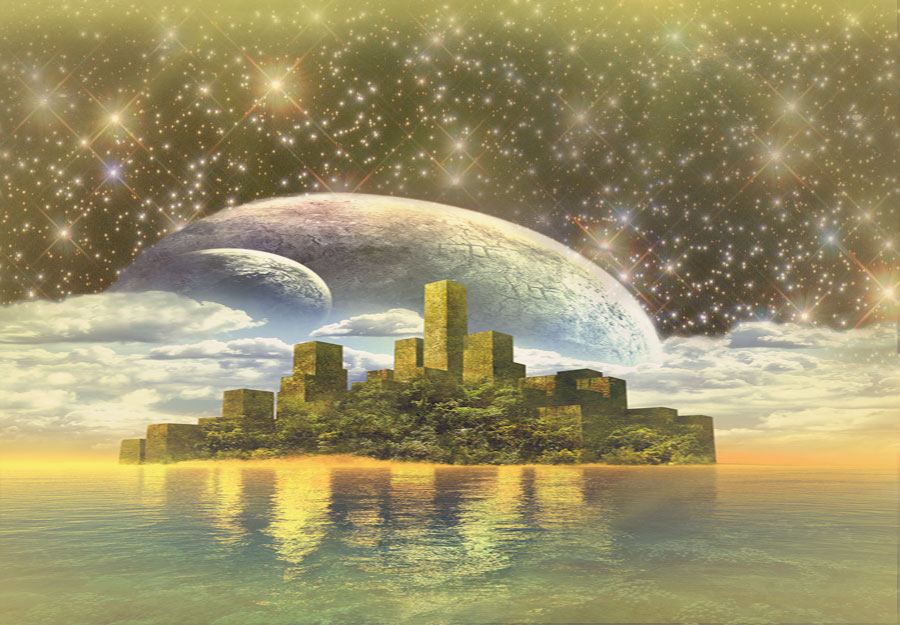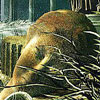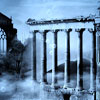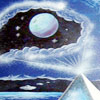It Has All Happened Before
 by Andrew Tomas
by Andrew Tomas
Civilization is largely the product of human intelligence. From caves to skyscrapers, from boomerangs to space satellites, is a jump achieved by the power of mind. Deprive man of one half of his present intellect, and the whole social edifice of today will suffer a setback comparable with a planetary disaster. Culture the mind, and you will have a sky-rocketing civilization. Develop the moral nature of humanity, and you will have a utopia to live in.
Intellectual development in human society is not unlike a chain reaction in nuclear physics. Jean Sylvain Bailly, the French astronomer of the eighteenth century, summed up this process like this: “Ideas have been successively gathered together, heaped up; they have mutually engendered each other, the one has led to another. It remains therefore merely to rediscover this succession, to begin with the earliest ideas; the path is traced out; it is journey that one may make again because it has already been made.”
Behind Copernicus, Galileo and Bruno stood the shades of Pythagoras, Aristarchus, Anaxagoras, Anaximenes and other Greek philosophers. Newton acknowledged his debt to antiquity by saying: “If I have seen further, it is by standing on the shoulders of giants.”
But many of these giants of the classic world studied, in their turn, at the feet of Egyptian hierophants. From whom did the wise priests of the Land of the Nile receive their secret philosophic and scientific tradition? From Thoth, who had come from an island in the Western Sea. Thus the fount of learning can be traced to legendary Atlantis.
Much of the New World civilization is an enigma without the Atlantis theory. No race ever built such roads as the Peruvians. They crossed the deepest canyons and pierced the highest mountains by tunnels which are still in use. On ancient asphalt-surfaced roadways modern cars travel today. No people, past or present, ever erected such megalithic structures as the pre-Incan races. No other nation ever has woven, by hand or machine, textiles of the workmanship of ancient Peruvians. No civilization ever had such an accurate astronomical calendar, in which every one of the 18,980 days were individually distinguishable, as the Aztecs and the Mayas.
Never in the world history till the twentieth century did any civilized nation live under any other economic system than that of private ownership. Yet the Incas had an economy in which money was non-existent. Everything belonged to the State. Regimented, perhaps, was the citizen of this South American empire, but he was secure in a welfare state built on strong ethical foundations.
When the white colonizers in Peru took over from the “Children of the Sun”, they fitted doors with bolts and locks. The Quechua Indians were not slow in realizing that they had been conquered by thieves. They recalled the years under the Incas when doors had been kept open due to the absence of burglars.
In a planned economy agricultural projects seem to have been so effectively carried out that we owe to the pre-Incas and Incas half of the foods we eat today.
In the Old World ancient Greeks measured the width of the tropical zone and knew about the land of the midnight sun. They discussed the question of other habitable continents and even worlds in space. The Hellenes had enough of an idea of the solar system to make models of it and build planetariums.
The gap between rich knowledge and poor instruments in antiquity has baffled many a scientist. A present-day science writer in the U.S.S.R., Alexander Kazantsev, voices these reflections on the subject:
“Amid the Egyptian pyramids, in the shadows of the columns in the temple of Ra, amid the white marble statues of Pallas and Jupiter, or in the philosophic solitude of the deserts, unknown scientists of remote antiquity perpetually observed the stars, laying foundation to astronomy—that science of nocturnal stillness, contemplative loneliness and sharp sight—the science of priests, dreamers and navigators, the science of exact calculations of time and space requiring complicated precision instruments. These were not available nor could they exist in ancient times, and yet certain astronomical knowledge of the ancients astounds us. Thousands of years before Copernicus and Galileo, the Egyptians knew well that the earth is a globe which revolves around the sun. Without any instrument for observation they were even aware how it moves. In ancient India the custodians of science—the priests—had long ago deduced that the universe was infinite, filled with a multitude of worlds. It is inconceivable how the ancients knew of the earth’s elliptical orbit round the sun. These ‘flashes of learning’ are in themselves of vast interest. The ancients were somehow in possession of the results of calculations rather than of the methods and equipment of precision instruments.”
A great portion of human progress can be attributed to evolution of society. However, some of the early achievements of mankind could have been a heritage from a prehistoric civilization.
Legends have faintly registered the voice of this vanished race. We must amplify it by means of deduction and imagination to make the voice clear and comprehensible.
Theory without factual corroboration leads to a labyrinth of speculation. On the other hand, the mere acquisition of facts degenerates into a data-collecting hobby. Each fact presented may not be decisive in itself. It is only the correlation of all evidence that can bring the overall picture into focus.
When Columbus began his plans to cross the Atlantic in search of a westward route to India, he made a deep study of classic writers. There were numerous indications in their works that, contrary to the opinions of authorities, the earth was round. He concluded that, in theory, he could reach the East by sailing west.
At Lisbon he was shown puzzling wood water pipes brought in by the Gulf Stream. Then news spread that two corpses of men with broad faces and black hair had been washed up at Madeira. They were smeared with strong essences which had protected the bodies from sharks and decomposition. The dead men were totally unlike any known people except Mongols. We now know that they were American Indians carried to Madeira from the Caribbean by the Gulf Stream. It was probably then that Christopher Columbus made his theory a working hypothesis.
The era of discovery and modern science began when progressive intellectuals of the Renaissance turned their faces towards ancient Romans, Greeks and Egyptians to hear about a forgotten science and its benefits to humanity. This science of antiquity is the foundation upon which our contemporary civilization is built.
Our jet engine is but a perfected turbine invented by Heron of Alexandria. The slot-machine of today, which throws out chocolates and cigarettes, had a prototype in the temple of Zeus in Athens. It dispensed holy water, and the heavier the coin, the more water came out from the container. A thousand and one examples could be quoted to illustrate that there is nothing new except what has been forgotten.
We have traveled a serpentine road touching the lakes of fancy one moment and the rocks of fact the next. Closer and closer have we moved towards a view of an advanced race in the mists of the past which may have left a buried treasure for our science.
On these pages a controversy has been raised which nothing but Time can resolve, for had not Thales said that “Time is the wisest of things for it finds out everything”?
An overall picture of the expansion of human consciousness in the course of ages shows that man has lately begun to feel that the world is greater than it was thought a few centuries ago. Only in recent historical times did our ancestors discard the childish cosmology in which the earth was flat and the center of the universe. In the past two hundred years science has proven that the cosmos is much vaster and older than our predecessors imagined.
If we approach the study of anthropology with a mind open to the possibility that man may be much more ancient than science holds, we will merely be detaching ourselves from the prejudices of the Middle Ages. Paleontology and archaeology have uncovered the remains of our primitive ancestors and their crude tools, and followed the human to his evolutionary infancy. Because the bones of Java, Peking and South Africa prehistoric men are the earliest found, it is supposed that homo sapiens appeared about one and a half million years ago. It is difficult to conceive cavemen leaving caves and trees a few thousand years ago and producing refined cultures of ancient Egyptians and Greeks in a few hundred generations. Though phenomenal accelerations are not foreign to evolution, it is essentially a very slow process.
It would be sheer obscurantism on our part to doubt the findings of science. The dating of prehistoric man, as we know him, is undoubtedly correct on the basis of evidence at our disposal at the present time. However, there is nothing impossible in discovering remains of older forebears of man. The greatest surprises may lie hidden in the sea beds.
Archaeology considers the civilizations of Mohenjo-Daro, Sumer or Egypt as the earliest in history. In fact, science does not recognize any history as such prior to about 5000 B.C. Nevertheless, there may be relics of advanced nations buried in the oceans. If discoveries are ever made to that effect, history will have to make drastic corrections.
The rise of man from simple agricultural states of the valleys of the Nile, Tigris and Euphrates to our present technological era is too short a period for so fantastic an advance, unless man carried with him hereditary traits from another cycle of civilization.
To have progressed from ox-pulled carts to luxurious automobiles and from boomerangs to earth satellites in the short period of six thousand years is truly a miracle. But science has no place for miracles. Unknown factors could account for them. The time is too brief because it represents but a fraction of one per cent of the total accepted age of man. The “caveman to spaceman in twenty-five thousand years” idea may be altogether erroneous.
It is anticipated that these views will be condemned by most scientists. Nevertheless, the controversy can be resolved overnight in our favor if one of the Atlantean ‘time capsules’ becomes accessible to the public. Until then this author is prepared to act as a target for the outbursts of irritated professors.
To summarize: man is more ancient than our academies conjecture. The earth has experienced violent cataclysms, mainly due to axis shifts and falls of huge meteorites. In these geological upheavals great civilizations disappeared without a trace.
Bhagavata Purana, a sacred book of India, speaks of four ages which have passed, each destroyed by the fury of the elements. Our present cycle is the fifth.
Hesiod, an ancient Greek poet who lived in the eighth century before our era, writes about a similar belief in Greece. There were four ages in the past. First, the gods created a golden race. They were mortal yet lived like gods. The second race was silver. They were of inferior intelligence. The next cycle was that of brass. Men were then strong and warlike and they destroyed themselves. The fourth era was the age of heroes whose adventures inspired men ever since. According to ancient Greek lore we are now in the fifth age—the age of iron. They believed we should likewise be destroyed by Zeus as were the other races. Censorinus (b. 238 A.D.) writes that the Greeks thought the world was either inundated or burnt after each epoch.
Ancient Egyptians divided history into three principal eras. First was the kingdom of the gods. In the second period demigods and heroes ruled on earth. Then with their departure, men reigned over Egypt and the world. When classic historians and myths speak of gods and demigods we do not take them seriously. Yet superior men could have walked the earth in a golden era.
In China the people of Yunnan have preserved the memory of an age when levitation of heavy rocks was a commonplace matter, when all were prosperous and lived long lives. The Pai tribesmen sing of that bygone epoch in these words:
In olden days rocks used to walk,
Is this true or false?
In olden days the rocks could walk,
This is true not false.
At that time the world was all peace,
Do you believe what I say?
At that time the world was all peace,
I believe what you say.
At that time there were no rich or poor,
Do you believe what I say?
At that time there were no rich or poor,
I believe what you say.
At that time people lived hundreds of years,
Do you believe what I say?
At that time people lived hundreds of years,
I believe what you say.
It is easy to call legends mere fantasy and laugh at the traditions of many peoples. It is much more difficult to appraise history in its entirety.
These written words have an aim and a moral. Its aim is to call the attention of the public to the possibility of a discovery of a hidden depository left by a race now considered mythical. Its moral is contained in the question: “Are we not treading upon the footsteps of Atlantis?”
At the entrance of La Sainte Chapelle in Paris a guide was explaining to us the meaning of various ornaments. Before the panel depicting Noah’s Ark and the Flood he delivered an oration on the biblical story of the Flood and concluded: “And so, mesdames et messieurs, people and animals began to multiply and, the process is still going on—till the next Flood.”
According to Plato, the Atlanteans perished when they were engaged in imperialistic wars. But in a better epoch they loved peace, cherished camaraderie and despised avarice.
It is only hoped that the modern world may ensure a better destiny for itself than Atlantis. The Catalan poet Jacinto Verdaguer mourned Atlantis in these words:
Atlantis, woe to thy children!
Alas, shall we live to see another dawn?
Our ancestor’s words came true one by one:
His Atlanteans, land and gods are no more.
Plutarch in Isis and Osiris recorded the opinion and belief of the most ancient sages “that there will become a fated and predestined time when the earth will be completely leveled, united and equal, there will be but one mode of life and but one form of government among mankind who will all speak one language and will live happily”.
The discovery of the Treasure of the Ages will completely revolutionize all of our views on ancient history. From the lessons of the past, mankind will learn to avoid the mistakes of the vanished race. Man will then be able to find his proper place on this beautiful planet, his true mission, and work towards a more glorious future.
Excerpt from Atlantis: From Legend To Discovery
Posted in Atlantis, True History of Manwith comments disabled.





